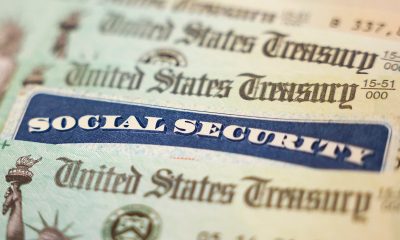Personal Finance
How To Get Out of Debt

If you’re in a situation where debt is negatively affecting your life, you’re probably looking to get out of it fast.
Read on to learn why it’s important to pay debt as soon as possible, as well as different methods of doing so, including budgeting, consolidating your debt and getting help from a debt settlement company.
Simplify your debt with Accredited
Click on your state and see if you qualify to reduce your credit card payments by up to 40% to be debt free in just 24-48 months.
Get Started
Terms & Conditions apply.
The dangers of allowing debt to linger
Debt that sticks around for too long can lead to the following:
Collections
If you’re over 120 days late paying a bill, it will probably be sent to collections. Collection companies buy the debt for pennies on the dollar, so they make a profit by collecting payments and their tactics can be aggressive. A collection’s impact on your credit report will depend on how long ago it was reported, among other factors; however, one thing is for sure — they will lower your credit score significantly.
Interest will continue to accrue
If you finance a purchase, it will cost more than the actual value of the item because interest is added. High interest rates keep the debt cycle turning, making it more difficult to pay down your balance.
Lower credit score
Lenders use credit reports to determine the risk of lending to you, so damaging your credit score with outstanding debts can have far-reaching effects. Excessive debt relative to your income, along with any missed or late payments will negatively impact your credit history and your ability to borrow in the future.
How to get out of debt fast
When it comes to getting out of debt quickly and regaining financial freedom, you have several options. Some of these are as straightforward as increasing your monthly payment while others may require more planning, such as budgeting.
The debt snowball method
The debt snowball method advises eliminating your smallest debts first.
This method recommends making the minimum monthly payments on all of your debts, but putting any extra cash you have toward the smallest debt. For example, you can make biweekly payments or double your minimum monthly payment to quickly pay off that particular debt.
Once your smallest balance is paid off, you will take the money you were previously using to pay off that debt and apply it to the next smallest. This cycle will continue until you are debt-free.
This method keeps many people motivated, since they can see results right away and eliminate bills quickly.
The debt avalanche method
While the debt snowball method focuses on paying off your smallest debt first, the debt avalanche method (also known as debt stacking) focuses on paying off the debt with the highest interest first.
The first debt will take the longest to pay off, but once that is complete, you can apply the money you used to pay off that debt to the debt with the next highest interest rate. As you move through this cycle, the remaining debt will take progressively less time to eliminate.
The benefit of the debt avalanche method is that you will pay less interest overall, and more money will be applied directly to the principal each month. The faster you can pay down your principal, the easier it is to pay off your credit cards and other debts.
Create a budget
Whether you’re looking for greater personal accountability or simply want to take a methodical approach, budgeting can be a useful tool.
There are budget apps and software that can assist you, or you can grab a sheet of paper and just do it the old-fashioned way.
The first and most important step is to fully educate yourself on your financial situation, including taking stock of your assets and liabilities. If your expenses exceed your income, a budget could help you see which expenses — if any — you could do without. But, even if you don’t have this problem, budgets are a great way to rework your monthly spending to free up money that you can put toward paying down your debts.
Check your credit report for errors
It’s excellent financial practice to check your credit report often, as mistakes in reporting are not uncommon. However, the Fair Credit Reporting Act (FCRA) provisions establish that credit lenders and bureaus can only report truthful and accurate information. This means that, if you find an error, you have a right to dispute it with the bureaus and creditors.
You can request your credit reports from the three major credit bureaus in the United States — Experian, Equifax and TransUnion — by going to www.annualcreditreport.com.
Some of the most common mistakes you may see on your credit report are payments labeled as late that were actually made on time, closed accounts that are still listed as open or outdated information that should not be reported anymore. Another mistake to watch out for is information that has been incorrectly attached to your account due to similarities in identifiable information such as a name or Social Security number.
If you have identified mistakes, you should take action to remove negative items from your credit report. You can file a dispute claim that includes proof or documentation of the error. These claims can take about a month for the credit bureau to investigate, but you will be notified within five days of their decision.
Alternatively, you can engage the services of a credit repair company to do the legwork for you.
Ask for better interest rates
Lowering your interest rates may be one of the quickest ways to reduce what you owe. A lower interest rate means that more of the money you pay goes directly to the principal balance (and therefore the quicker you can eliminate your debt).
While you usually can’t negotiate a reduction in your balance, you may be able to get your creditor to lower your interest rate. Each company has different rules for negotiation, but you’ll never be penalized for asking.
Entering the negotiation with some leverage will be your best chance of success. If you can find a competitor that offers a lower rate on an equivalent credit card or loan, your creditor may agree to match the interest rate as a way to keep your business. Try to avoid leveraging a temporary or promotional rate because creditors are much less likely to match those.
Earn extra income
If your primary income is not enough to adequately cover your debt payments, consider picking up a side gig for at least a period of time. There are plenty of ways you can make more money and boost your monthly income. Some common part-time jobs include driving for rideshare services, taking shifts at a restaurant, transcribing and cleaning. You can use this extra income to pad your savings or make extra payments toward reducing your debt.
Adjust your spending habits
Take a look at your bank statement and go over your expenses with a fine-toothed comb. We can sometimes be surprised by how much of our income went to discretionary spending. If this is the case, make sure to take note and see whether you can spend that amount on paying down your debt instead. This will reduce the amount of interest you’re paying and get you that much closer to being debt-free.
Take out a debt consolidation loan or balance transfer credit card
A debt consolidation loan or balance transfer credit card can help simplify your financial situation if you have multiple accounts with large balances and high interest rates. Either a loan or a card can combine a variety of debts from various lenders into one, manageable monthly payment and, hopefully, at a lower rate.
Financial institutions offer debt consolidation loans that will help you combine and resolve unsecured debts. These personal loans enable you to pay off balances faster, and some of the best debt consolidation loans can save you money in the long run.
If you’re only dealing with credit card debt, a balance transfer credit card works similarly. You can use one card to consolidate the balances of your other credit cards. Then, you can focus on one monthly payment schedule and interest rate. The best balance transfer credit cards will even give you a low intro APR (or no APR) for anywhere between 12 to 21 months when you transfer your balance.
Ask a credit counselor about a debt management plan
If you prefer to have a financial expert assist you in managing your debt, you can meet with a credit counselor. These typically work on a nonprofit basis to assist people with low income or poor credit scores.
Debt management plans are carried out over an extended period of time (often three to five years) to ensure that you have the information, resources and guided experience needed to handle your debt independently.
Work with a debt settlement company
While they shouldn’t be the first tool you choose, debt settlement companies can be effective. These companies will communicate with creditors for you and negotiate lower payments, but these negotiations can negatively affect your credit report for up to seven years.
Debt settlement companies work for profit but give no guarantee of success. If they attempt to negotiate with your creditor and fail, you still have to pay them. On the other hand, if they succeed, you may pay less than what you originally owed. For those who need to know how to get out of debt quickly, this option should be the last step before bankruptcy.
Consider bankruptcy as a last resort
Bankruptcy is another option for resetting your finances, but it should be your last resort. When debtors file for Chapter 13, also known as reorganization, they enter a court-mandated repayment plan. Personal loans, credit cards and medical bills may be reduced or discharged, but other types of debt, like student loans, must still be paid. To file for bankruptcy, you must contact a bankruptcy lawyer and file the required financial documentation with the court.
Should you pay debt collectors or creditors?
If your debt has gone to collections, it’s sometimes still possible (and beneficial) to pay your original creditor. Your creditor may be willing to negotiate your balance, interest rate or payment plan. This is easiest to do if the creditor recently sent your debt to collections.
If the original creditor has sold its rights to your debt, you’ll have to pay your debt collector directly. You may still be able to negotiate a partial payment with a debt collector. Debt collectors buy debts from creditors at a steep discount because the original lender no longer believes you will pay off the debt. Because the debt collectors are less financially invested, they may accept a partial payment.
Take steps toward a debt-free life
There is no single best way to get out of debt, but there are many options if you want to be debt free. Strategies like debt consolidation, budgeting, adjusting spending habits and negotiating lower interest rates can help you reduce your monthly payments and eventually lead a debt-free life.
© Copyright 2023 Money Group, LLC. All Rights Reserved.
This article originally appeared on Money.com and may contain affiliate links for which Money receives compensation. Opinions expressed in this article are the author’s alone, not those of a third-party entity, and have not been reviewed, approved, or otherwise endorsed. Offers may be subject to change without notice. For more information, read Money’s full disclaimer.
Read the full article here

-

 Make Money6 days ago
Make Money6 days ago4 Tips to Grow a Side Hustle While Working Full Time (and Have a Life)
-

 Passive Income5 days ago
Passive Income5 days agoHow to Ensure AI Is Being Used Ethically in Your Business
-

 Side Hustles6 days ago
Side Hustles6 days agoBuying a Business? 3 Secrets to Master the Ownership Transition With Ease
-

 Make Money5 days ago
Make Money5 days ago4 Ways to Get $10 in Sam’s Club Cash for Free This Week
-

 Investing4 days ago
Investing4 days agoTaiwan Semi to generate $110 billion in 2025 revenue: Needham By Investing.com
-

 Side Hustles3 days ago
Side Hustles3 days agoNHTSA Investigates Tesla Full Self-Driving Feature
-

 Side Hustles3 days ago
Side Hustles3 days ago3 Ways Data Can Drive Sustainable Decision-Making in Business
-

 Side Hustles4 days ago
Side Hustles4 days ago3 Traits Founders Need to Land Investments: Daniel Lubetzky


















